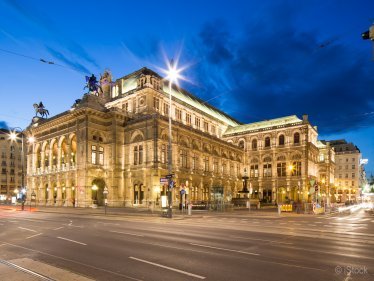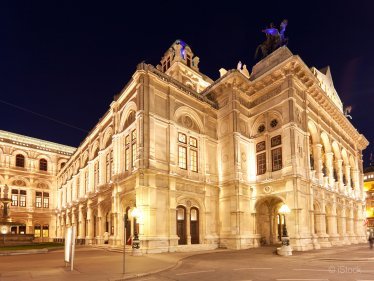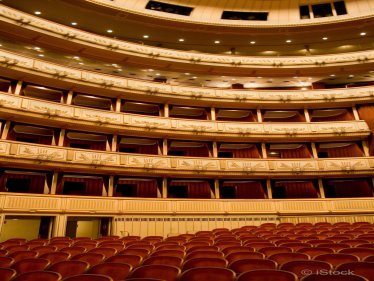Il Barbiere di Siviglia - Schedule, Program & Tickets
Il Barbiere di Siviglia
Text by Cesare Sterbini after Pierre Augustin Caron de Beaumarchais
Comic opera in two acts
Cast
Musical direction
Diego Matheuz
Staging and stage
Herbert Fritsch
Costumes
Victoria Behr
Light
Carsten Sander
Graf Almaviva
Lawrence Brownlee
Bartolo
Fabio Capitanucci
Rosina
Patricia Nolz
Don Basilio
Adam Palka
Figaro
Adam Plachetka
Marzellina (Berta)
Jenni Hietala
Contents
Despite his self-promotion, Figaro's ideas prove unhelpful when he is tasked with helping Count Almaviva win the hand of Rosina. Rosina lives in prison with her guardian, Doctor Bartolo, who wants to secure her fortune by marrying her himself. All of Figaro's plans for how Almaviva could get closer to his beloved fail in what is most amusing for the audience. Ultimately, money and power make the Count the victor in this fight, which is a game for himself but bitter seriousness for Bartolo.
The barber of Seville presents himself as the »factotum of the whole city«: as a helper in all situations. Like all barbers of his time, he was not only responsible for caring for the beard and hair, but also for pulling teeth and letting blood. In addition, Figaro's offer also includes services for lovers and those willing to marry, such as clandestine delivery of letters or commissioned serenades.
The opera was originally called Almaviva, o sia L'inutile precauzione (Almaviva or Useless Caution) - so the main character was Count Almaviva. However, public love quickly focused on the extroverted barber. A contributing factor was that the Count's great aria »Cessa di più resistere« was and is often deleted because of its length and immense difficulty. In fact, it is not the barber's escalating strategies, but the nobleman's means of power that help his love to victory.
The opera is based on the play of the same name by Pierre-Augustin Caron de Beaumarchais, which premiered in 1775. He transformed character types and plot elements of the Italian impromptu comedy, the Commedia dell'arte, first into an opera comique, then into a prose comedy, which also included impressions of a trip to Spain. The play later became the first part of Beaumarchais' Figaro trilogy.
The opera also owes its enormous stage effectiveness to the libretto by Cesare Sterbini, which provided Rossini with ideal musical occasions, including for one of his famous ›crescendo rolls‹: Bartolo’s ally Basilio draws in detail the »slander aria« La calunnia e un venticello Development of a rumour, from a soft whisper to the explosion of a ›shitstorm‹. And in the finale of Act I, the text of the opera conjures up the image of a »hell forge«, which the music gleefully paints with the sound of hammers and anvils.
ACTION
1st act
In front of Doctor Bartolo's house
Under the balcony of a stranger whom he has been admiring from afar for weeks, Count Almaviva is serenading, accompanied by musicians hired by his servant Fiorello. The barber Figaro appears. He is a former servant of the Count and knows the beautiful stranger: it is Rosina. As the barber of her guardian Doctor Bartolo, he has access to his house. Rosina appears on the balcony and drops a letter before Doctor Bartolo can intervene. In the letter she asks her admirer to explain his intentions and expresses her unconditional desire to "break her chains". With a song, Count Rosina introduces himself as a poor student Lindoro - the young woman should choose him out of love and not because of his high status. Figaro explains that Doctor Bartolo wants to marry Rosina to get her dowry. He suggests that the Count disguise himself as a soldier and give him a billeting order to gain access to the house. In order to appear harmless, he should also pretend to be drunk.
In Doctor Bartolo's house
Rosina is determined to use all her skill and disobedience to win Lindoro over Bartolo's resistance. Doctor Bartolo suspects that Rosina and Figaro are up to something against him. He first questions Rosina, then the housekeeper Berta and the servant Ambrogio, but receives no information. Rosina's music teacher, Don Basilio, reports to Doctor Bartolo that Rosina's secret admirer, Count Almaviva, has been seen in town. Doctor Bartolo decides to marry Rosina the very next day. Don Basilio suggests discrediting the Count by slander. Figaro has overheard the two and tells Rosina about Bartolo's plans. Rosina is particularly interested in Lindoro, whom she saw with Figaro. Figaro claims that he is his cousin and very much in love with Rosina. Figaro demands a letter for Lindoro - but Rosina wrote it long ago. Bartolo finds out about Rosina's secret correspondence and quits her even stricter surveillance. Disguised as a drunken soldier, the Count breaks into Bartolo's house. His attempt to send a letter to Rosina leads to a riot that calls the city guard into action. Their officer wants to arrest the supposed soldier as a troublemaker. When the latter unobtrusively identified himself as a count, he immediately withdrew his order – to the great dismay of everyone present.
ACT 2
In Doctor Bartolo's house
The Count appears again: He has now disguised himself as the music teacher Don Alonso and pretends to stand in for Don Basilio, who is ill. He tells the suspicious Bartolo that he stayed at the same inn as Count Almaviva, where an amorous note from Rosina fell into his hands. He wanted to use it to discredit the Count at Rosina. Bartolo agrees and calls Rosina to the singing lesson. Rosina recognizes her admirer Lindoro in Don Alonso. Figaro arrives to shave Doctor Bartolo. Following a tip from Rosina, he manages to steal the key to the balcony door. When Don Basilio suddenly appears, the Count's camouflage threatens to be blown. Inconspicuously, he slips Don Basilio a gift of money and with combined forces, Don Basilio is ushered out of the house.
Figaro tries to distract Bartolo from the two lovers, but Bartolo overhears a careless word from the Count and sees through the swindle. The Count and Figaro flee. Don Basilio tells Bartolo that Don Alonso was sent by Count Almaviva. Doctor Bartolo now wants to push ahead with his marriage to Rosina all the more urgently and sends Don Basilio to fetch the notary. Bartolo shows Rosina the note as proof that Don Alonso and Figaro wanted to drive her into the arms of a Count Almaviva. Rosina, stunned by this news, agrees to marry Bartolo. She also reveals that Figaro and her suitor want to break into the house at midnight in order to kidnap her. When Figaro and the Count arrive, Rosina pushes back the supposed matchmaker Lindoro, whose fraud she thinks she has seen through. When Lindoro reveals himself as Count Almaviva and confirms the seriousness of his intentions, Rosina is overjoyed.
Don Basilio appears with the notary. Figaro explains that those present are his niece and Count Almaviva, whose marriage the notary was to perform that same evening in Figaro's house. The notary has the marriage contract with him. The Count puts the reluctant Don Basilio in his head to choose between a precious ring and two balls. Don Basilio chooses the ring and signs the marriage contract as best man. Doctor Bartolo has summoned soldiers and demands the arrest of the burglars. When Count Almaviva makes himself known to him, refers to the valid marriage contract and gives Bartolo Rosina's dowry, the latter accepts his defeat.
Subject to change.
Comic opera in two acts
Cast
Musical direction
Diego Matheuz
Staging and stage
Herbert Fritsch
Costumes
Victoria Behr
Light
Carsten Sander
Graf Almaviva
Lawrence Brownlee
Bartolo
Fabio Capitanucci
Rosina
Patricia Nolz
Don Basilio
Adam Palka
Figaro
Adam Plachetka
Marzellina (Berta)
Jenni Hietala
Contents
Despite his self-promotion, Figaro's ideas prove unhelpful when he is tasked with helping Count Almaviva win the hand of Rosina. Rosina lives in prison with her guardian, Doctor Bartolo, who wants to secure her fortune by marrying her himself. All of Figaro's plans for how Almaviva could get closer to his beloved fail in what is most amusing for the audience. Ultimately, money and power make the Count the victor in this fight, which is a game for himself but bitter seriousness for Bartolo.
The barber of Seville presents himself as the »factotum of the whole city«: as a helper in all situations. Like all barbers of his time, he was not only responsible for caring for the beard and hair, but also for pulling teeth and letting blood. In addition, Figaro's offer also includes services for lovers and those willing to marry, such as clandestine delivery of letters or commissioned serenades.
The opera was originally called Almaviva, o sia L'inutile precauzione (Almaviva or Useless Caution) - so the main character was Count Almaviva. However, public love quickly focused on the extroverted barber. A contributing factor was that the Count's great aria »Cessa di più resistere« was and is often deleted because of its length and immense difficulty. In fact, it is not the barber's escalating strategies, but the nobleman's means of power that help his love to victory.
The opera is based on the play of the same name by Pierre-Augustin Caron de Beaumarchais, which premiered in 1775. He transformed character types and plot elements of the Italian impromptu comedy, the Commedia dell'arte, first into an opera comique, then into a prose comedy, which also included impressions of a trip to Spain. The play later became the first part of Beaumarchais' Figaro trilogy.
The opera also owes its enormous stage effectiveness to the libretto by Cesare Sterbini, which provided Rossini with ideal musical occasions, including for one of his famous ›crescendo rolls‹: Bartolo’s ally Basilio draws in detail the »slander aria« La calunnia e un venticello Development of a rumour, from a soft whisper to the explosion of a ›shitstorm‹. And in the finale of Act I, the text of the opera conjures up the image of a »hell forge«, which the music gleefully paints with the sound of hammers and anvils.
ACTION
1st act
In front of Doctor Bartolo's house
Under the balcony of a stranger whom he has been admiring from afar for weeks, Count Almaviva is serenading, accompanied by musicians hired by his servant Fiorello. The barber Figaro appears. He is a former servant of the Count and knows the beautiful stranger: it is Rosina. As the barber of her guardian Doctor Bartolo, he has access to his house. Rosina appears on the balcony and drops a letter before Doctor Bartolo can intervene. In the letter she asks her admirer to explain his intentions and expresses her unconditional desire to "break her chains". With a song, Count Rosina introduces himself as a poor student Lindoro - the young woman should choose him out of love and not because of his high status. Figaro explains that Doctor Bartolo wants to marry Rosina to get her dowry. He suggests that the Count disguise himself as a soldier and give him a billeting order to gain access to the house. In order to appear harmless, he should also pretend to be drunk.
In Doctor Bartolo's house
Rosina is determined to use all her skill and disobedience to win Lindoro over Bartolo's resistance. Doctor Bartolo suspects that Rosina and Figaro are up to something against him. He first questions Rosina, then the housekeeper Berta and the servant Ambrogio, but receives no information. Rosina's music teacher, Don Basilio, reports to Doctor Bartolo that Rosina's secret admirer, Count Almaviva, has been seen in town. Doctor Bartolo decides to marry Rosina the very next day. Don Basilio suggests discrediting the Count by slander. Figaro has overheard the two and tells Rosina about Bartolo's plans. Rosina is particularly interested in Lindoro, whom she saw with Figaro. Figaro claims that he is his cousin and very much in love with Rosina. Figaro demands a letter for Lindoro - but Rosina wrote it long ago. Bartolo finds out about Rosina's secret correspondence and quits her even stricter surveillance. Disguised as a drunken soldier, the Count breaks into Bartolo's house. His attempt to send a letter to Rosina leads to a riot that calls the city guard into action. Their officer wants to arrest the supposed soldier as a troublemaker. When the latter unobtrusively identified himself as a count, he immediately withdrew his order – to the great dismay of everyone present.
ACT 2
In Doctor Bartolo's house
The Count appears again: He has now disguised himself as the music teacher Don Alonso and pretends to stand in for Don Basilio, who is ill. He tells the suspicious Bartolo that he stayed at the same inn as Count Almaviva, where an amorous note from Rosina fell into his hands. He wanted to use it to discredit the Count at Rosina. Bartolo agrees and calls Rosina to the singing lesson. Rosina recognizes her admirer Lindoro in Don Alonso. Figaro arrives to shave Doctor Bartolo. Following a tip from Rosina, he manages to steal the key to the balcony door. When Don Basilio suddenly appears, the Count's camouflage threatens to be blown. Inconspicuously, he slips Don Basilio a gift of money and with combined forces, Don Basilio is ushered out of the house.
Figaro tries to distract Bartolo from the two lovers, but Bartolo overhears a careless word from the Count and sees through the swindle. The Count and Figaro flee. Don Basilio tells Bartolo that Don Alonso was sent by Count Almaviva. Doctor Bartolo now wants to push ahead with his marriage to Rosina all the more urgently and sends Don Basilio to fetch the notary. Bartolo shows Rosina the note as proof that Don Alonso and Figaro wanted to drive her into the arms of a Count Almaviva. Rosina, stunned by this news, agrees to marry Bartolo. She also reveals that Figaro and her suitor want to break into the house at midnight in order to kidnap her. When Figaro and the Count arrive, Rosina pushes back the supposed matchmaker Lindoro, whose fraud she thinks she has seen through. When Lindoro reveals himself as Count Almaviva and confirms the seriousness of his intentions, Rosina is overjoyed.
Don Basilio appears with the notary. Figaro explains that those present are his niece and Count Almaviva, whose marriage the notary was to perform that same evening in Figaro's house. The notary has the marriage contract with him. The Count puts the reluctant Don Basilio in his head to choose between a precious ring and two balls. Don Basilio chooses the ring and signs the marriage contract as best man. Doctor Bartolo has summoned soldiers and demands the arrest of the burglars. When Count Almaviva makes himself known to him, refers to the valid marriage contract and gives Bartolo Rosina's dowry, the latter accepts his defeat.
Subject to change.
There are no products matching the selection.








